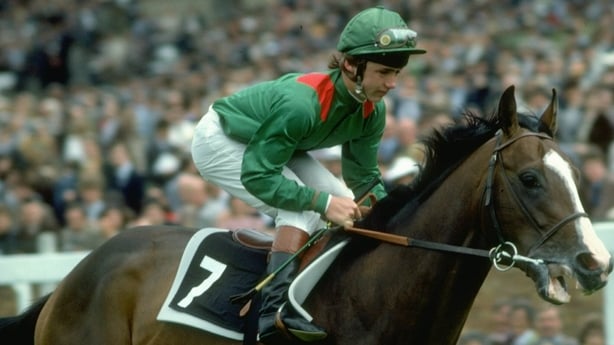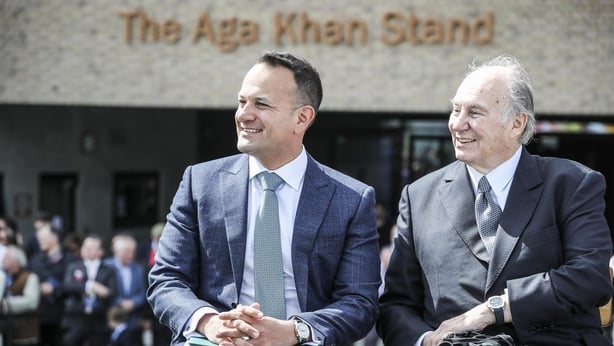As tributes are paid to the Aga Khan following his death at the age of 88, the revered owner-breeder will always be associated with his mighty colt Shergar, the spectacular winner of the 1981 Derby.
But the Shergar story went on to run much deeper than that, with the horse being stolen from Ballymany Stud in County Kildare. He was never found and it is a puzzle that will probably never be solved.
Shergar was lionised in the racing world for the manner of his Epsom triumph under the teenage Walter Swinburn, and to this day his winning margin of 10 lengths stands as a record for a race first run in 1780.
The Aga Khan, spiritual leader of the Ismaili sect of Shia Muslims, landed the much-sought-after prize another four times, with Shahrastani, Kahyasi, Sinndar and Harzand, but none of them could match the impact made by his first winner.
The big bay with the white blaze had secured his position among the 20th-century greats by the time the curtain came down on his career at the end of the 1981 season, but the drama was far from over.
On the night of February 8, 1983, a foggy evening, intruders broke into the Aga Khan's Ballymany Stud and stole the horse.
It is generally accepted the IRA were the culprits, that his abductors were ill-equipped to control a thoroughbred stallion, and that he was killed shortly afterwards. But his remains have never been found.

Shergar’s racing career was guided by Michael Stoute, who sent him out to win six of his eight races, taking the Sandown Classic Trial by 10 lengths and the Chester Vase by 12 on the way to Epsom, where he started a 10-11 chance and won in a stroll.
With Swinburn suspended he was ridden by Lester Piggott to win the Irish Derby by four lengths.
But the young rider was back in the saddle for another four-length victory against the older generations in the King George VI And Queen Elizabeth Stakes at Ascot.
Both Shergar’s defeats came at Doncaster, where he closed his racing career with an inexplicable loss at long odds-on in the St Leger.
The wonder horse was syndicated for stud duties and arrived at Ballymany with everything ahead of him.
But he was to become one of the more celebrated victims of 'the Troubles’ when armed raiders stole him one winter’s night after forcing groom Jim Fitzgerald to follow instructions at gunpoint.
With the thieves apparently unaware the Aga Khan was no longer the sole owner of the horse, demands for payment of a massive ransom came to nothing. It all ended in tragedy, of course, and it remains a mystery as to where the horse’s remains are buried, in some unmarked grave with no plaque or statue to celebrate his glory.
Periodic ‘finds’ have unearthed nothing more than skeleton impostors; as any racing fan could attest, there was only one Shergar.
After all this time, Shergar’s name is more pertinently linked with that of another infamous absentee, Lord Lucan, than with the Derby.
The racing world, however, has not forgotten. The abiding memory will forever be of Epsom in 1981, and that wonderful moment rounding Tattenham Corner when Swinburn flicked the switch and the afterburners powered on.
All that disappeared that day was the opposition as Shergar cleared away, his rivals withering to dots in the distance.
"There’s only one horse in it… you need a telescope to see the rest!" said BBC radio commentator Peter Bromley. You certainly did.
A notable supporter of Irish racing, the Aga Khan was one of the driving forces behind the redevelopment of the Curragh, with the plan eventually coming to fruition in 2019 when he joined the then taoiseach Leo Varadkar to officially unveil the new Aga Khan Stand.

The Aga Khan Trophy is a renowned event on the Irish showjumping calendar, which takes place during the Dublin Horse Show at the RDS every summer. The trophy was donated by the Aga Khan's father, a regular visitor, back in 1926.
The Aga Khan's Irish stars were concentrated with Dermot Weld, who provided a fifth Derby win in 2016 with Harzand, who memorably triumphed under the late Pat Smullen, despite picking up a foot injury on the day of the race. Harzand went on to give the Aga Khan a fifth Derby and Irish Derby double when scoring at the Curragh later the same month.
It was Weld who also produced the Aga Khan’s last British Classic winner in the 2024 Oaks victor Ezeliya.
The Aga Khan’s sporting interests extended further than racing and he was a highly accomplished skier who represented Iran at the 1964 Winter Olympics, taking on the slalom, giant slalom and downhill events.
The Aga Khan is survived by three sons and his daughter.
We need your consent to load this rte-player contentWe use rte-player to manage extra content that can set cookies on your device and collect data about your activity. Please review their details and accept them to load the content.Manage Preferences

